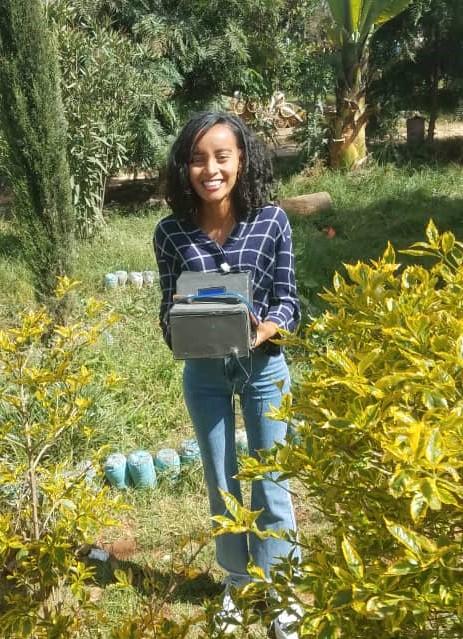AI-powered soil testing amplifies farmer productivity and climate resilience in Ethiopia

What if there was a solution to help farmers take the guesswork out of what to plant in their fields and how to optimally nourish it based on the soil nutrient profile? This is precisely what Omishtu-Joy is providing to smallholders in Ethiopia. Omishtu-Joy, which means “Joy of the Farmer” in Afaan Oromo (a native Ethiopian dialect), has developed a soil testing device that uses artificial intelligence (AI)-powered sensors to measure different soil parameters. These soil fertility parameters include pH levels, nitrogen, potassium and phosphorous, humidity, radiation, temperature and soil moisture measured by a device developed by the firm. The device then transmits the data to the Omishtu-Joy mobile app for analysis which in turn advises farmers on the best crops to cultivate for that soil type. This innovation is heralding a quiet revolution in Ethiopia: one of Africa’s agricultural powerhouses.
Despite its immense land mass (1.13 million square kilometers) and population (estimated to reach 150 million by 2035)(1) , Ethiopia’s food security is precarious because of several factors including declining soil fertility caused by continuous cropping with insufficient replenishing of lost nutrients. According to the Global Yield Gap Atlas(2) , Ethiopia’s maize yields are only 30% of what they could be.
Armed with the correct information on their soils’ profiles and the correct types of fertilizers to be applied on their farms, smallholders are now empowered to get better yields and incomes. So far, more than 5,000 farmers have benefitted from this service. The device can produce results in as fast as 10 minutes, which is significant considering the environment in which extensive soil testing was hampered by low testing capacity and outdated equipment. Where farmers could not access modern soil testing services, tests were limited to rudimentary methods such as grabbing a handful of soil and feeling it for moisture or checking for earthworms to confirm the soil health. Though primitive, this method was considered effective as it relied on visible parameters. However, digital innovations such as those by Omishtu-Joy are providing fast and cost-effective alternatives with more comprehensive analysis. Each test costs 20 Ethiopian Birr (US$0.37,) which most farmers could consider affordable.
Their work is vital because it aligns with the Government of Ethiopia’s strategic priorities of improving food security. Omishtu-Joy has entered into a partnership with the Ministry of Agriculture: as a private firm, they are contributing to promoting better soil fertility management across the country. The firm has started to register farmers for soil testing and soil health restoration services with support of the Ethiopian government.
To improve its capacity in product development, investment generation and operations, Omishtu-Joy has been participating in a three-month accelerator initiative jointly managed by GIIF and Intellecap. The accelerator is a follow-on activity from the Africa AgTech & Inclusive Insurance Challenge in which top agtech innovators working at the intersection of agriculture, insurance and climate in Africa were identified. Through the accelerator, these small and medium enterprises will receive support in optimizing business operations, marketing and product development. Through the accelerator, the GIIF programs seeks to generate knowledge materials to tell a story in enterprise acceleration development for rural populations.
As a result of the accelerator experience, Omishtu-Joy is now better placed to scale the business by introducing new product offerings in financial services. It is also increasing its revenue to become profitable. The firm has increased its capacity in operations by hiring a business and operations lead to ensure efficiency. Other benefits include support for developing training materials that are now used to communicate the company's objectives to current and new staff through trainings.
Omishtu-Joy is promoting this innovative service through product advertising, word of mouth by farmers, cooperatives and its staff.
The firm plans to reach more than 10,000 farmers in coming years with their soil testing devices and services. For farmers, having real-time information on the fertility of their farms’ soils could lead to proper identification of fertilizers to be used to boost soil fertility.
Tigabu Abriham, CEO, Omishtu-Joy explains: “Prior to the accelerator we had limited knowledge and capacity to develop the business model toward profitability. The GIIF AgTech accelerator opened our eyes to these possibilities in our business environment. It was after the accelerator that we signed an MoU with the Cooperative Bank of Oromia to offer financial services to smallholder farmers.”
During the implementation of the accelerator initiative, Omishtu-Joy undertook a redevelopment project for their cloud infrastructure to develop a credit scoring algorithm using the data collected from farmers during testing, to offer input credit facilities to farmers in partnership with the Cooperative Bank of Oromia. The firm plans to scale this project to eventually pilot and roll out an insurance offering to farmers.
William Mulehi made valuable contributions to this blog. He is the Principal, Business Consulting and Research at Intellecap.
(1) World Bank Group 2017. Ethiopia Country Partnership Framework
